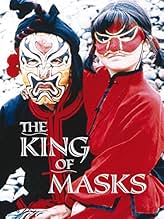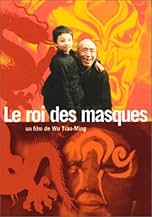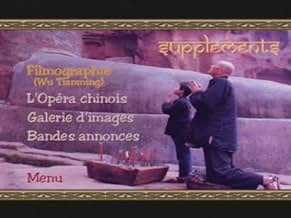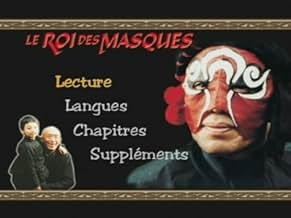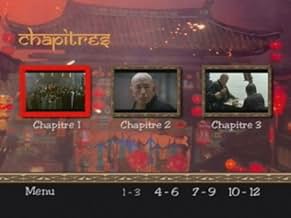IMDb RATING
7.7/10
3.6K
YOUR RATING
In a remote area of China, in the 1930s, a street performer named Wang practices the change-mask opera art of bian lian. Seeking to pass his art, Wang buys what he believes to be an orphan b... Read allIn a remote area of China, in the 1930s, a street performer named Wang practices the change-mask opera art of bian lian. Seeking to pass his art, Wang buys what he believes to be an orphan boy, but quickly learns his new disciple's secret.In a remote area of China, in the 1930s, a street performer named Wang practices the change-mask opera art of bian lian. Seeking to pass his art, Wang buys what he believes to be an orphan boy, but quickly learns his new disciple's secret.
- Awards
- 21 wins & 5 nominations total
- Director
- Writers
- All cast & crew
- Production, box office & more at IMDbPro
7.73.5K
1
2
3
4
5
6
7
8
9
10
Featured reviews
Nice Story; Lousy DVD
The fact that this film was put out on DVD still formatted-to TV and with a fuzzy picture really annoyed a lot of film purists......and rightly so. This deserves a lot better treatment.
The story is about a street performer who needs a son to pass on his craft (the rules of the day) and winds up with a little girl instead (not the conventional way) ....and the problems that ensue afterward. The old man had bought the kid at a slave auction and soon discovers the kid is not a boy, which he obviously thought was the case.
The old man "Bianlian Wang (Xu Zhu)is kind of funny-looking with a missing front tooth and an infectious grin. The little girl "Doggie" (Zhou Renying) is a cutie. The rest of the story is how the two manage after that. I usually like a nice sentimental ending but this gets a bit carried away in the final 15 minutes.
Overall, it's involving story complete with drama, suspense, humor and sadness. Just don't expect a good quality picture for the money you are spending on the DVD. Until it comes out on widescreen, rent it.
The story is about a street performer who needs a son to pass on his craft (the rules of the day) and winds up with a little girl instead (not the conventional way) ....and the problems that ensue afterward. The old man had bought the kid at a slave auction and soon discovers the kid is not a boy, which he obviously thought was the case.
The old man "Bianlian Wang (Xu Zhu)is kind of funny-looking with a missing front tooth and an infectious grin. The little girl "Doggie" (Zhou Renying) is a cutie. The rest of the story is how the two manage after that. I usually like a nice sentimental ending but this gets a bit carried away in the final 15 minutes.
Overall, it's involving story complete with drama, suspense, humor and sadness. Just don't expect a good quality picture for the money you are spending on the DVD. Until it comes out on widescreen, rent it.
A Beautiful Film
This is a beautiful, rich, and very well-executed film with a rich and meaningful story. Basically, it tells how an old master story teller needs to find a (male) heir to carry on his craft, but ends up not getting what he expected in his very male-dominated world. The characters must then deal with their situation and the old master must grapple with the conflict between his desire for a companion and heir and his and society's traditional notions.
The story is fun, emotional, and complex. The exploration of the characters, their lives, and emotions, is rich and compelling the character development is strong while the characters are complex and not one dimensional at all. The film expertly conveys the old man's emotions and his desire to find an heir, and compellingly shows how he and the kid handle the situation. There is also humour, sometimes quite subtle, at appropriate points. The film also examines the good and bad of traditional Chinese culture, creating further interest and depth to the film.
The directing, acting, and scenery are all outstanding. Added to the other strengths, this creates rich and convincing visual images and compelling, real characters. As a result, the film evokes strong empathy for, and feelings about, the characters.
Some have claimed that the ending weakens the film, but I do not necessarily agree. Perhaps it could have been stronger with a different ending, but any improvement in the overall film would have been rather small.
The story is fun, emotional, and complex. The exploration of the characters, their lives, and emotions, is rich and compelling the character development is strong while the characters are complex and not one dimensional at all. The film expertly conveys the old man's emotions and his desire to find an heir, and compellingly shows how he and the kid handle the situation. There is also humour, sometimes quite subtle, at appropriate points. The film also examines the good and bad of traditional Chinese culture, creating further interest and depth to the film.
The directing, acting, and scenery are all outstanding. Added to the other strengths, this creates rich and convincing visual images and compelling, real characters. As a result, the film evokes strong empathy for, and feelings about, the characters.
Some have claimed that the ending weakens the film, but I do not necessarily agree. Perhaps it could have been stronger with a different ending, but any improvement in the overall film would have been rather small.
10pyotr-3
Wildest thing I've ever seen!
This spectacular film is one of the most amazing movies I have ever seen. It shows a China I had never seen or imagined, and I believe it shows 1930's China in the most REAL light ever seen in a movie. It is absolutely heart-breaking in so many situations, seeing how hard life was for the characters, and yet the story and the ending are incredibly joyful. You truly see the depths and heigths of human existence in this film. The actors are all perfect, such that you feel like you have really entered a different world.
I simply can not recommend this movie highly enough. It may just change you forever once you have seen it.
I simply can not recommend this movie highly enough. It may just change you forever once you have seen it.
It reminded me of Mulan.
This movie reminded me of Mulan- only because I saw Mulan first. It was a great film, and as an Asian female and a first-generation American, I found myself relating to "Doggie" (the little girl; by translation). I usually don't cry during movies (and I don't think being 8 and watching The Land Before Time counts), but I do admit my eyes did water up. I was impressed at the production quality of this film and I appreciated the accuracy of its set period. It's imagery was hauntingly beautiful and throughout the film I was questioning this film's budget (The Red Violin as well)- I was contemplating how they were able to afford props and costumes and still be able to release, promote and distribute the film at the same time. The King Of Masks is one of those wonderful pieces of International Cinema that almost everyone can agree on.
10N6APV
A beautiful movie that is criminally misrated. It is
The movie is truly poignant, unique and uplifting. The story is universal in that it's a battle between good, evil and the world between. THE MOST IMPORTANT thing is that its rating is wrong, misleading, and a travesty. Blockbuster has it rated as though it were an X rated movie. The truth is is that it is closer to G than PG and should be seen by children who can read the clear and simple sub-titles.
Did you know
- GoofsWhen Wang (The Mask King) is performing for the soldiers who insist on having his secret, his missing front tooth is there in one scene, then gone in the next.
- Alternate versionsOriginal Chinese version runs 101 minutes; international Version runs 91 minutes.
- How long is The King of Masks?Powered by Alexa
Details
Box office
- Gross US & Canada
- $1,113,103
- Gross worldwide
- $1,113,103
Contribute to this page
Suggest an edit or add missing content


